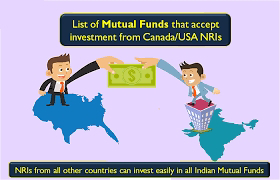Can NRIs based out of US and Canada invest in Indian mutual funds?
Yes, NRIs based out of US and Canada can invest in Indian mutual funds. However, AMCs do not have a uniform policy to deal with US and Canadian clients.
Currently, close to 14 fund houses receive investment from investors based out of these two countries and another five AMCs receive investment only from US.
Broadly, there are two categories of fund houses here - where investors are not required to physically present in India and vice versa.
Here is the list of fund houses where investors are not required to be physically present in India:
Aditya Birla Sun Life Mutual Fund
Nippon India Mutual Fund
Quant Mutual Fund
Sundaram Mutual
UTI Mutual Fund
Interestingly, these fund houses allow such NRIs to invest in their MF schemes without any restriction that too through online transaction.
Let us look at the fund houses which insist NRIs to be physically present in India:
360 One Mutual Fund
Axis Mutual Fund
DSP Mutual Fund (Only lumpsum)
ITI Mutual Fund (Only lumpsum)
Kotak Mutual Fund
Navi Mutual Fund
PPFAS Mutual Fund
SBI Mutual Fund
Taurus Mutual Fund
White Oak Capital Mutual Fund
Similarly, here is the list of fund houses, which receive money only from US investors:
Bandhan Mutual Fund (Only US)
Edelweiss Mutual Fund (Only US)
HDFC Mutual Fund (Only US)
ICICI Mutual Fund (Only US)
Motilal Oswal Mutual Fund (Only US)
Please note that all these fund houses receive investment only through physical mode. Also, these fund houses insist NRIs to submit application form along with a declaration form indicating their residential status.
Coming to the second part of your query, NRIs residing in US and Canada will have to share Foreign Account Tax Compliance Act (FATCA) details and tax identification number (TIN) along with KYC details.
FATCA declaration form captures information like type of address (residence, business, registered office etc.), country of tax residence, tax identification number, Global Intermediary Identification Number (GIIN) and seek investors consent for sharing the information with relevant tax authorities.
For KYC, here is the list of valid KYC documents:
PAN card
Overseas address proof
Passport
Passport size photograph
OCI Card (In case of foreign passport holder)
For transaction, an NRE (Non-Resident External) or NRO (Non-Resident Ordinary) account is a must.
Feel free to Contact us:
Sharda Deepakraj Lala
Founder of Siddhantha Wealth Managers
Call/WhatsApp 9870096055



Comments
Post a Comment